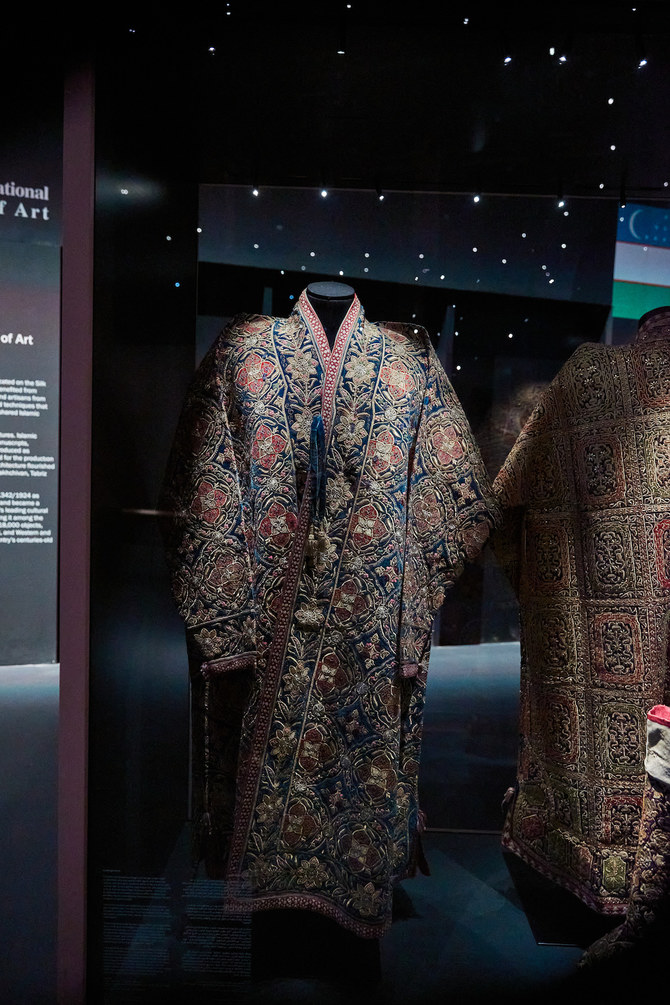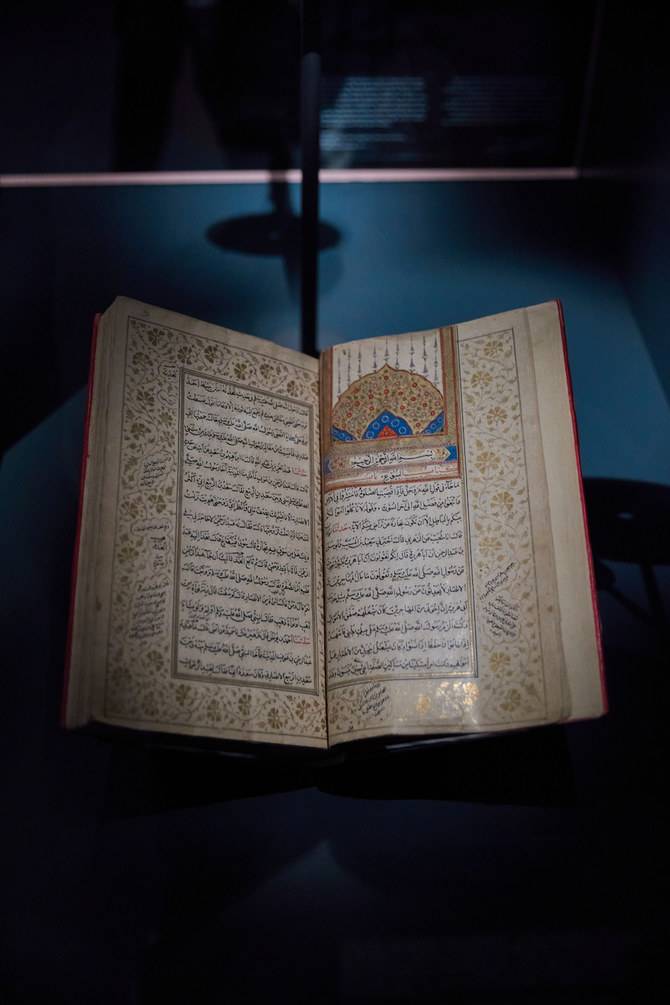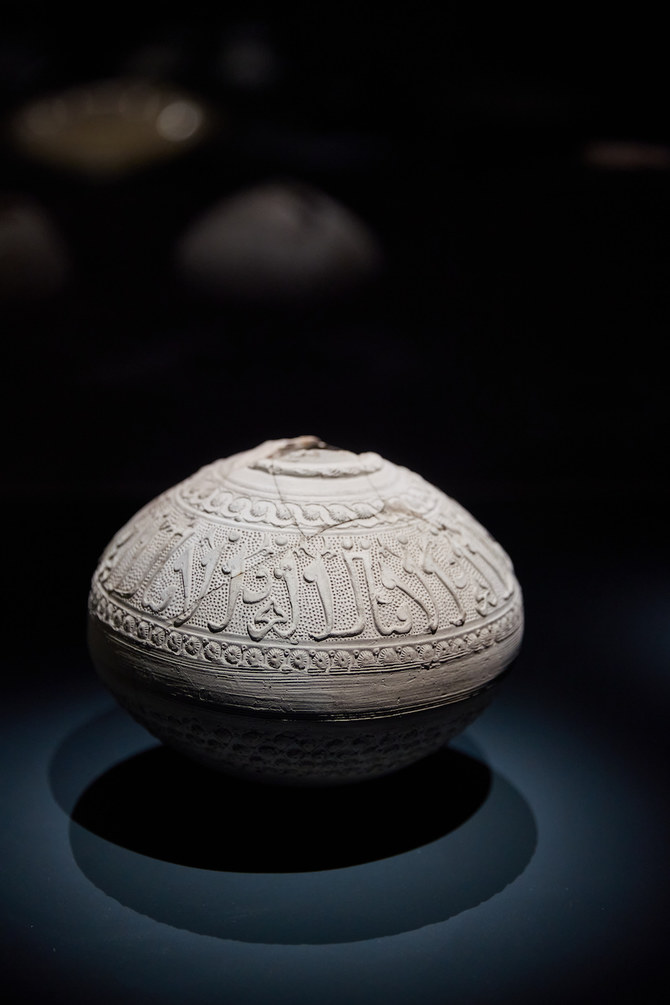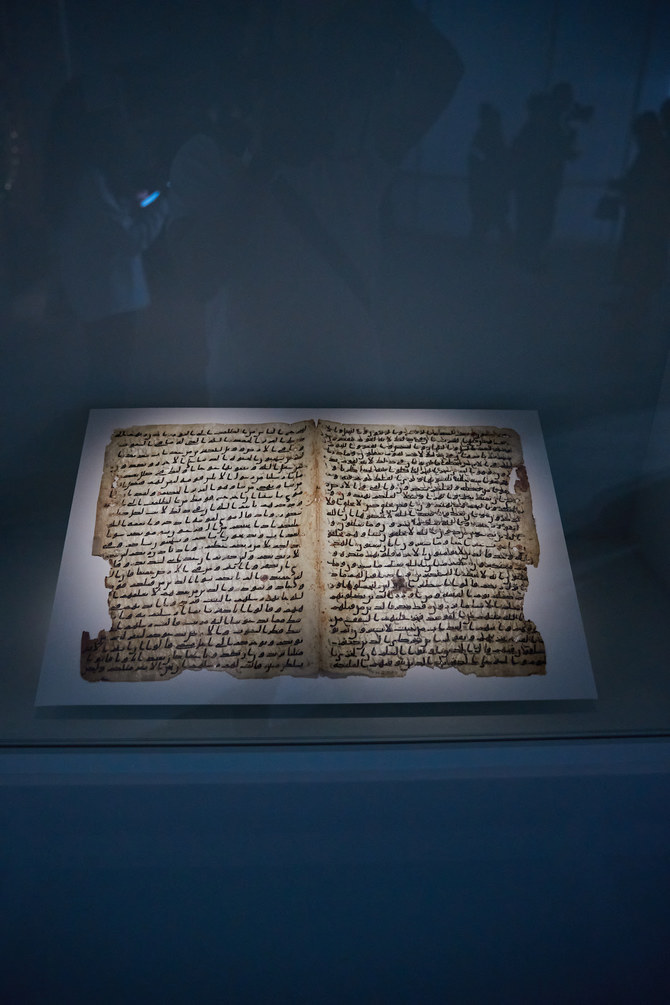JEDDAH: The darkened hall at gallery 5 at the Islamic Arts Biennale at the Hajj terminal in Jeddah offers visitors plenty of ambiance to see the artifacts from a dozen respected institutions. One highlight is by the Republic of Uzbekistan, a country in Central Asia, roughly a six-hour flight away.
Visitors will have an opportunity to witness the treasure trove of Uzbekistan artifacts brought in for the first time at the first ever Islamic Arts Biennale.
The Uzbek team carved out a beautiful and integral part within the Islamic Arts Biennale by showcasing 17 ethnography and textiles of the Islamic period. The collections on display came in from the State Museum of Arts of Uzbekistan, the State Museum of History of Uzbekistan, the Samarkand Museum-Reserve, as well as the original book “Al-Jami as-Sahib” by Imam al Bukhari. But most of all, the true gems were two legible pages of one of the oldest Uzbek Qurans. They make their world premiere at the Islamic Arts Biennale.
Soft spoken, eloquent and elegant, Gayane Umerova, the executive director of the Art and Culture Development Foundation under the Cabinet of Ministers of the Republic of Uzbekistan has eyes glistening as bright as the golden threads in the garments on display.
The Katta Langar Quran from the eight century is one of the oldest manuscripts in the Islamic World and is named after an Uzbek village. The Quran has a significant place in this exposition, as 13 pages were restored recently in cooperation from specialists of the Louvre Museum in Paris. At the Islamic Arts Biennale, four of those pages will be showcased, two of which will be seen by the public for the very first time ever.
“It's the first time I would say those pages are shown outside of Uzbekistan. It was kept in quite bad shape before it was restored—it was really kept not as an object to be shown at art institutions, it was more used as an object of research,” Umerova told Arab News.
“For us it was a great success what we did in Paris but also was very privileged to bring it here to Saudi, as we consider it the cradle of Islamic culture. It was very important for us also to have our own kind of saying in this exhibition,” she told us.
“It took us four years. We signed all the papers with the French colleagues in 2018. And then we started working for two years, but then it was a pandemic,” she said.
The pandemic served as a blessing in disguise as the restoration stage was forced to be temporarily halted. This allowed the pages to be pressed for nearly a year longer than planned since nobody was allowed near the facility which housed the delicate pages.
At the Islamic Arts Biennale, those pages were among the first pieces to be inserted into the Biennale upon arrival to hot and humid Jeddah, as it was fragile and needed to be installed in the climate and light controlled clear box.
The 17 chosen objects of ethnography and textile will represent the Islamic period in the arts and crafts of Uzbekistan. In addition to the Katta Langar Quran, ceramic jugs and mugs from Samarkand and Afrasiyab of the 10th-12th centuries and a selection of flamboyant menswear, boots and other unique artifacts are on display.
“The Biennale of Islamic Art is an important international event that gives the platform to showcase projects centered around Islamic culture. Uzbekistan has a rich and complex history, a big part of which is deeply connected to the traditions of Islam. We are presenting a selection of various objects that will serve to promote these vital traditions globally,” Umerova said.
The curatorial team of the Biennale of Islamic Art in Jeddah includes experts from Saudi Arabia, the UK, the US and South Africa.
“It was very important to show different angles of the culture. From the oldest piece that we bring, the Quran, to the youngest, the men’s garments because it's considered to be 19th century,” she said.
“We really tried to not to forget about our kind of Islamic heritage because we are a secular state, but we're very close to the Islamic culture,” Umerova said.
Many in Hejaz have Uzbek roots and this offers them a glimpse to see something authentic from their origins.
“There is not so many events in the world happenings where we can feel brotherhood or sisterhood, you know, in a way. And I think this is a great cultural event,” Umerova conducted.
She appreciated how this Islamic Arts Biennale combined contemporary art because that style can be transformative and engage visitors. She hopes to continue to connect with the organizers and said she extended a formal invite to the organizing foundations to join her in Uzbekistan in 2024.
Umerova has been invested and connected to this sphere for decades. She started her career as a senior curator at the Art Gallery of Uzbekistan in 2008. In 2012, she joined Sotheby’s as research assistant at the Russian department. In 2013, she was awarded a prize for the Artists’ Union of CIS countries art confederation for “Observations of the Unseen World” project discovering Islamic ornamental system in art of Central Asia. She worked for Christie’s for one year ending in 2015 before being appointed as deputy executive director of the Art and Culture Development Foundation. In 2020, she was promoted to her current positions and has initiated ambitious projects for the foundation abroad and in Uzbekistan. In 2011 she curated the 6th Tashkent International Biennale of Contemporary Arts in Uzbekistan. She is also the secretary general of the National Commission of the Republic of Uzbekistan for UNESCO.
Organized by the Diriyah Biennale Foundation and the Ministry of Culture of Saudi Arabia, the Islamic Arts Biennale hopes to connect “the past, present, and future” by showcasing a vibrant display of Islamic artistry.
The biennale will be held on the territory of the Hajj Terminal. An additional 70,000 square meter space will also be created for the biennale, to host exhibition areas, a theater, a mosque, workshops, shops and restaurants.
Created under the decree of the Uzbek President Shavkat Mirziyoyev, the Art and Culture Development Foundation, under the cabinet of ministers of the Republic of Uzbekistan was founded in 2017. Its aim is to foster international cooperation and promotes the culture of Uzbekistan on the international stage. It initiated the exhibit found at the Gallery 5, called AlMadar. The area aims to engage with international and local institutions, showcasing tangible and intangible traditions of the Islamic World. In collaboration with various stakeholders, AlMadar aspires to become a global network for thought-provoking dialogue, exchange of practices and innovative research. The Uzbek program includes public talks, music performances and workshops that bring the cultural heritage of the Islamic period of Uzbekistan to life. Also a screening of the 1924 silent film ‘The Minaret of Death’ in addition to workshops in suzani, which is a type of embroidered and decorative tribal textile made from countries such as Uzbekistan.
According to Umerova, the Islamic Arts Biennale is an important international event that allows for the showcasing of projects related to Islamic culture and an opportunity for Saudi visitors to be immersed in the theme. Uzbekistan has a rich and multifaceted history, most closely connected with Islam’s traditions, and the selection of exhibits presented by Uzbekistan is designed to interest the visitors at the Islamic Arts Biennale and Saudi community.
Saida Mirziyoyeva, Deputy Chairman of the Council of the Art and Culture Development Foundation of the Republic of Uzbekistan said in a statement: “It is a great honor for us to present priceless exhibits from Uzbekistan at the Islamic Arts Biennale. An important task of the Foundation is to disseminate and demonstrate the rich heritage of our country to an international audience, as well as to establish strong international cooperation.”
Hosted by the Diriyah Biennale Foundation in collaboration with the Saudi Ministry of Culture, The 17 objects will be on display until April 23 when the Islamic Arts Biennale concludes.
For further details, visit the official website and social media channels.





















